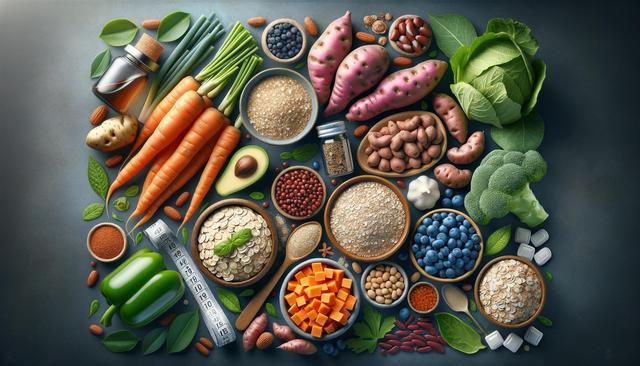Leafy Greens and Non-Starchy Vegetables
Leafy greens and non-starchy vegetables are essential in a diabetes-friendly diet. These foods are low in carbohydrates and calories while being rich in vitamins, minerals, and fiber. Fiber plays a crucial role in slowing down the absorption of sugar in the bloodstream, which helps in maintaining steady blood glucose levels. Leafy greens such as spinach, kale, and arugula are ideal because they have a minimal impact on blood sugar. Non-starchy vegetables like broccoli, cauliflower, zucchini, and bell peppers can be included daily in meals for variety and balanced nutrition. Incorporating these into your diet offers one of the practical tips to manage diabetes effectively. Consider steaming, grilling, or stir-frying them with minimal oil to preserve nutrients and flavor.
Whole Grains and Complex Carbohydrates
Whole grains and other sources of complex carbohydrates are more beneficial for blood sugar control compared to refined grains. These foods are digested more slowly, leading to a gradual rise in blood sugar levels. Examples of diabetes-friendly whole grains include:
- Oats
- Quinoa
- Brown rice
- Whole wheat
- Barley
These grains are high in fiber and can help improve insulin sensitivity over time. When planning meals, pair these grains with a source of healthy fat or protein to maintain balanced blood sugar. Monitoring portion size is also important, even with whole grains, to avoid spikes in glucose. Integrating whole grains into your meal plan is among the useful tips to manage diabetes effectively on a daily basis.
Lean Proteins and Plant-Based Options
Protein is a vital component for people managing diabetes as it helps maintain muscle mass and contributes to satiety without raising blood sugar levels. Lean animal proteins like skinless poultry, eggs, and certain types of fish are good options. However, plant-based proteins are increasingly recognized for their health benefits. Foods such as lentils, chickpeas, tofu, and tempeh not only provide protein but also come with additional fiber and antioxidants. Including a variety of protein sources supports overall health and helps maintain stable blood sugar levels. Choosing nutrient-dense proteins is one of the sustainable tips to manage diabetes effectively and supports long-term wellness.
Healthy Fats for Blood Sugar Balance
Not all fats are equal when it comes to diabetes management. Healthy fats can support heart health and blood sugar control when consumed in moderation. These include:
- Avocados
- Nuts and seeds (like almonds, chia seeds, flaxseeds)
- Olive oil
- Fatty fish such as salmon or sardines
These fats contain omega-3 fatty acids and monounsaturated fats that can reduce inflammation and improve insulin sensitivity. Replacing saturated and trans fats with these healthier alternatives can positively impact cholesterol levels and reduce the risk of cardiovascular complications often associated with diabetes. Including healthy fats in your meals is a valuable approach among the tips to manage diabetes effectively while promoting overall metabolic health.
Fruits with a Low Glycemic Index
While fruits contain natural sugars, many of them have a low glycemic index (GI) and can be safely included in a diabetes-friendly diet in moderation. Low-GI fruits lead to a slower increase in blood glucose and offer essential nutrients such as fiber, antioxidants, and vitamins. Some of the better fruit choices include:
- Berries (blueberries, raspberries, strawberries)
- Apples (with skin)
- Pears
- Peaches
- Oranges
Portion control is key when consuming fruits. Pairing a small serving with a protein or fat source like nuts or yogurt can further minimize any blood sugar spikes. Choosing the right fruits and consuming them thoughtfully is one of the helpful tips to manage diabetes effectively and enjoy a balanced diet without deprivation.
Conclusion: Building a Sustainable and Balanced Diet
Managing diabetes through food is not about strict limitations but about making informed and thoughtful choices. Incorporating a variety of nutrient-dense foods such as leafy greens, whole grains, lean proteins, healthy fats, and low-GI fruits can support blood sugar control and improve overall well-being. These food choices, combined with lifestyle habits like regular physical activity and stress management, form the foundation of effective diabetes care. For anyone seeking practical and lasting tips to manage diabetes effectively, focusing on whole, minimally processed foods is a step in the right direction. Adopting these habits can lead to improved energy levels, more stable glucose readings, and a healthier life overall.



Leave a Reply